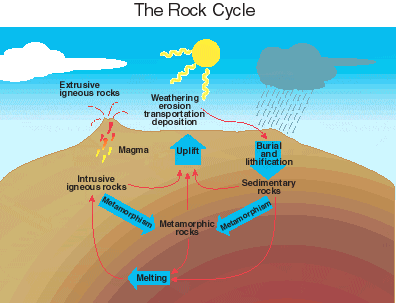1. adj. []
One of the three main classes of rock (igneous, metamorphic and sedimentary). Sedimentary rocks are formed at the Earth's surface through deposition of sediments derived from weathered rocks, biogenic activity or precipitation from solution. Clastic sedimentary rocks such as conglomerates, sandstones, siltstones and shales form as older rocks weather and erode, and their particles accumulate and lithify, or harden, as they are compacted and cemented. Biogenic sedimentary rocks form as a result of activity by organisms, including coral reefs that become limestone. Precipitates, such as the evaporite minerals halite (salt) and gypsum can form vast thicknesses of rock as seawater evaporates. Sedimentary rocks can include a wide variety of minerals, but quartz, feldspar, calcite, dolomite and evaporite group and clay group minerals are most common because of their greater stability at the Earth's surface than many minerals that comprise igneous and metamorphic rocks. Sedimentary rocks, unlike most igneous and metamorphic rocks, can contain fossils because they form at temperatures and pressures that do not obliterate fossil remnants.
See related terms: acoustic basement, carbonate, cement, cementation, chert, chlorite, clastic sediment, clay, clean, coal, compaction, condensed section, craton, depositional environment, diagenesis, diatom, dike, dolomite, evaporite, feldspar, gypsum, halite, hard rock, lamination, lithification, matrix, petrography, platform, quartz, reef, reservoir, rhombohedral packing, siliciclastic sediment, soft rock, stratigraphic trap, stratum, uniformitarianism
